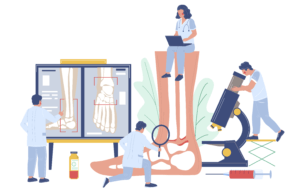Making her own way in business
A Career Series in Podiatry – Afni Shah-Hamilton
Afni advises a number of professional organisations and provides specialist cancer care within her clinic. She tells ConsultingFootPain how she came to take up podiatry and carved a niche associated with cancer treatment targetting the foot. Her advice and knowledge behind developing a viable business shine out for anyone considering a career as an independent podiatrist.
Taking a different career route
 Afni started out as a dental nurse when she was 16. Unable to afford to pursue a career in dentistry she identified podiatry as an opportunity s to run her own medical business. Coming from an Asian family of business owners had a significant influence on her although it was still new territory to be striking out on her own,
Afni started out as a dental nurse when she was 16. Unable to afford to pursue a career in dentistry she identified podiatry as an opportunity s to run her own medical business. Coming from an Asian family of business owners had a significant influence on her although it was still new territory to be striking out on her own,
“I think I’m the first generation where the whole family isn’t involved in the business; with a medical clinic, you are on your own. But that’s how it started.”
Initially, she admits that she underestimated the complex workings of the foot and the need to understand wider human anatomy. After three years of studying towards a podiatric medicine degree, she realised there was a lot more to learn in this profession as well as plenty of opportunities to specialise in areas of interest such as cancer and diabetic treatments.
Studying at University College London, she reflects on the strong foundations drummed into the students.
“Joining up the dots between anatomy and infection, between foot health and medicine is essential. Exposure to rheumatoid conditions and even sexual diseases, like syphilis, which is on the rise, can be represented in the foot. I was lucky to study pharmacology and get to understand how wider medications (unrelated to foot health) can impact the lower limb.” She gives the example of steroids being taken for lung conditions that can cause the skin on the legs and feet to thin and oxygen deprivation can lead to clubbing of nails.
At the time though, Afni was more inspired by exposure to the unusual cases she saw interesting other London universities. Attending the London School of Tropical Medicine and Hygiene she saw leprosy patients which is where her interest in wound care began.
After qualifying, Afni went to work for Southwark NHS, putting her knowledge into practice. At the time, Southwark was embracing innovative therapies, giving her training in areas such as acupuncture and low-level laser. She also appreciated the valuable links with Guys and St Thomas’ London teaching hospitals, which gave her exposure to complex ulcers and highlighted the connections with biomechanics rather than seeing the management as isolated. Such challenging cases forced her to better understand orthoses and how to adapt these for specific complications rather than simply relying on the basic variations.
Launching her own practice
 The dentist with who she had worked as a dental nurse supported her in launching her own business and allowed her to start seeing private patients at his dental clinic. Working evenings and weekends, whenever she could fit in the appointments around her day job and the hours of the dental practice, she slowly started to build up a base of regular patients and she branded her practice Tiptoe Foot Care which she still uses today.
The dentist with who she had worked as a dental nurse supported her in launching her own business and allowed her to start seeing private patients at his dental clinic. Working evenings and weekends, whenever she could fit in the appointments around her day job and the hours of the dental practice, she slowly started to build up a base of regular patients and she branded her practice Tiptoe Foot Care which she still uses today.
Using the knowledge, based on how a dental practice operated, Afni decided to structure her own business on their practice system. Afni points out,
“The key element in running a private practice isn’t the high-end treatments. Whilst this may be interesting or appealing, dentists will tell you their bread and butter involve hygiene and check-ups, with secondary elements being the cosmetic side and managing pain (emergency treatments). The same logic applies to podiatry – treating nails, verrucas and hard skin may not be glamorous but they provide a significant patient base which you then build on with cosmetic treatments and managing injuries.”
Adding to her skill set
Recognising that she needed to broaden her business skills in order to make her practice and brand name successful, Afni embarked on a Master’s degree in Public Service Policy and Management. This helped her to understand alternative healthcare models, some of the risks and pitfalls involved, and also how to communicate effectively with other business owners and in a boardroom setting. This has been hugely helpful not only in ensuring the success of her business by ensuring it adapted and evolved to changing circumstances and economic pressures but allowing her to engage confidently in an advisory role.
The business woman
She found that broadening her skills allowed widened her opportunities. For example, she locumed for the NHS for three or four days a week and then worked in her private (dental) practice in the evenings.
To expand her private practice she visited nursing homes and was able to command high charges because
“they knew how competent I was, and also, I was very good at spotting ulcers and potential problems at an early stage. This helped the care home managers to appreciate my expertise, and they recognised I was saving them from having to deal with more serious (and expensive) emergency care.”
She worked long hours – up to 12 hours a day, six days a week.
“It doesn’t come easy, but it’s worth it. It takes time to build up your own business so I needed the reliable income but also needed to take every opportunity I could to grow and move forward.”
The problems when growing your business
Her loyal client base grew steadily by word of mouth. Positive referrals arrived through the process of building good relationships with other medical practitioners, and her private practice took more and more of Afni’s time. After renting rooms in various clinics for a session or two a week, she moved into her own premises in 2012. She expanded to include associate podiatrists, employed reception staff and occasionally mentors university students.
Whilst loving the independence that running her own practice provides, Afni worries that sometimes prospective practice owners underestimate the work and costs involved, particularly if they haven’t had separate business training.
“There is a lot of management time involved in running a private practice and with ever-increasing costs. Examples include regulation, maintaining appropriate health and safety protocols, data security and insurance, but perhaps more significantly the way we now operate has changed. It used to just be phone calls to arrange appointments, adverts in the local paper, paper patient records and cash payments. Additional costs include website design and maintenance, running payroll and providing pensions for employees, online booking systems, and credit card machines. It is easy to overlook many of these initial steps when developing a private practice as a viable business model. Getting sucked into a lot of start-up expense without fully appreciating the number of patients they’ll need to treat before it becomes profitable is something to avoid.”
Developing a niche in cancer management

Afni’s involvement in cancer care actually started out through her interest in wound care treatment.
“One of my patients was a younger patient under the vascular care at Barnet General. The consultant saw my work in treating a complex ulcer and phoned me to ask if I could treat his patients. The vascular consultant started recommending patients to me, and then word got out more widely in the oncology department through positive feedback from the patients. Other patients who had cancer came to me via word of mouth.”
Being pleased with her exposure and success with these referrals, Afni started to undertake more research on cancer treatment and the adverse effects that cancer medications had on patients. She wasn’t treating cancer itself but the impact on the lower limb, either directly or indirectly as a result of their treatment programme. This expertise has steadily developed over the years, including awareness of how different ethnic groups might be impacted differently by certain medications, and now she’s helping to share this knowledge with other podiatrists through journal articles in an effort to improve awareness.
When she became involved with Macmillan Cancer support, she was used as an independent podiatrist to sit on the advisory board.
“That was quite a big thing because no one was sitting for them from podiatry. Cancer patients don’t typically qualify for podiatric treatment under the NHS, despite all these side effects, and there was no real link into the private sector.”
She feels it is disappointing that universities are not including more work on cancer care treatments within their podiatry courses as this would be a key area to develop this area of specialty. Understanding wound care and the effects of cancer on the skin, with the circulation and nervous system affected, is essential, so it potentially pulls together core aspects from a number of modules and can help in ensuring these are linked together rather than viewing a problem purely from one angle.
Constantly learning and evolving, Afni has now broadened her training to cover wider pain management, using her podiatric and anatomical training to help patients manage more complex and inter-connected pain issues across their whole body. She sees this as a natural extension of her cancer work and is increasingly using these skills to support ‘post-cancer’ patients who have been managing or living with a variety of pain-related issues during their treatment but now need support in helping their bodies recover some of its former movement.
The next generation
Afni believes that as far as inspiring people in podiatry, whether in private practice or working with cancer patients, one has to be comfortable in the basics and then find a niche to interest and motivate yourself.
“If one door closed, it doesn’t necessarily mean another won’t open. It is important to be adaptable and open to opportunities, even if they don’t immediately appear to take you where you expected to go. It’s also important to get a breadth of training and solid foundations before you try to specialise as it is this core underlying knowledge that will help not just in building a client base more quickly, but in providing the best care in your specialist area.”
Diversifying into cancer management is not common amongst podiatrists and her focus on reducing pain and suffering due to many side effects from medications used to treat cancer is unique and unchartered.
“There are so many people facing cancer today who would benefit from treatment and just don’t realise what can be done to ease their pain. And in terms of podiatric expertise, cancer’s not a scary thing or beyond our capabilities. We just need to consolidate and expand our knowledge as a profession. The skill is available to all podiatrists. They just haven’t necessarily been exposed to it or had the opportunity to learn some of these core aspects.”
Her articles on cancer care treatments in podiatry have been featured in ConsultingfootPain which influence her series in the quarterly journal for the Institute of Chiropodists and Podiatrists (IOCP). Recently she was awarded a Consultant Fellowship for her work in cancer treatments and pain management. You can read the first of her series below and other career articles from different podiatrists and their journeys.

Five conditions in feet caused by cancer treatment
What Career to Choose After School?
Read the background to podiatry from the author

Sign-up for here my regular FREE newsfeed
Thanks for reading “Cancer Specialist in Podiatry” with Afni Shah-Hamilton
Published by Busypencilcase Communications. Est. 2015 for ConsultingFootPain



Trackbacks/Pingbacks